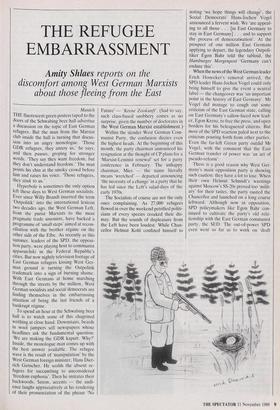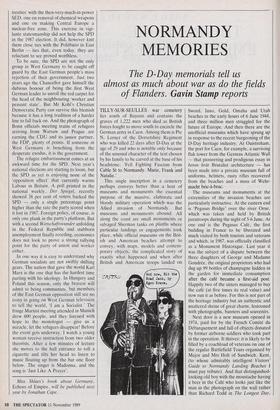THE REFUGEE EMBARRASSMENT
discomfort among West German Marxists about those fleeing from the East
Munich THE fluorescent green posters taped to the doors of the Schwabing beer hall advertise a discussion on the topic of East German refugees. But the man from the Marxist club inside the hall is turning that discus- sion into an angry monologue. 'Those GDR refugees, they annoy us,' he says, and then pauses, groping for stronger words. 'They say they want freedom, but they don't understand freedom.' The man points his chin at the smoky crowd before him and raises his voice. 'Those refugees, they stink to us.'
Hyperbole is sometimes the only option left these days to West German socialists. Ever since Willy Brandt inserted the term `Ostpolitik' into the international lexicon two decades ago, the West German Left, from the purist Marxists to the most pragmatic trade unionists, have backed a programme of 'small steps' aimed at recon- ciliation with the brother regime on the other side of the Elbe. As recently as this summer, leaders of the SPD, the opposi- tion party, were playing host to communist appararchiki in the Federal Republic's cities. But now nightly television footage of East German refugees kissing West Ger- man ground is turning the Ostpolitik trademark into a sign of burning shame. With East Germans at home marching through the streets by the million, West German socialists and social democrats are finding themselves in the embarrassing situation of being the last friends of a bankrupt regime.
To spend an hour at the Schwabing beer hall is to watch some of this chagrined writhing at close hand. Downstairs, beards in wool jumpers sell newspapers whose headlines ask the fundamental question: 'We are making the GDR kaputt. Why?' Inside, the monologue man comes up with the best answer available. The refugee wave is the result of 'manipulation' by the West German foreign minister, Hans Diet- rich Genscher. He scolds the absent re- fugees for succumbing to unconsidered 'freedom euphoria'. Then he imitates their backwoods, Saxon, accents — the audi- ence laughs appreciatively at his rendering of their pronunciation of the phrase 'No
Future' — 'Keene Zookunfe. (Sad to say, such class-based snobbery comes as no surprise, given the number of doctorates in the West German Marxist establishment.)
Within the slender West German Com- munist Party, the confusion dizzies even the highest heads. At the beginning of this month, the party chairman announced his resignation at the thought of CP plans for a 'Marxist-Leninist renewal' set for a party conference in February. The unhappy chairman, Mies — the name literally means 'wretched' — departed announcing 'the necessity of a change' in a party that he has led since the Left's salad-days of the early 1970s.
The Socialists of course are not the only ones complaining. As 27,000 refugees flowed in over the weekend petrified politi- cians of every species croaked their dis- may. But the sounds of displeasure from the Left have been loudest. While Chan- cellor Helmut Kohl confined himself to
noting 'we- hope things will change', the Social Democrats' Hans-Jochen " Vogel announced a fervent wish. We 'are appeal- ing to all those . . . [in East Germany to stay in East Germany] . . . and to support the process of democratisation'. At the prospect of one million East Germans applying to depart, the legendary Ostpoli- tiker Egon Bahr told the tabloid, the Hamburger Morgenpost 'Germany can't endure this'.
When the news of the West German leader Erich Honecker's removal arrived, the . SPD leader Hans-Jochen Vogel could only bring himself to give the event a neutral label — the changeover was 'an important point in the history of East Germany'. Mr Vogel did manage to cough out some criticism of the East German state, calling on East Germany's sallow-faced new lead- er, Egon Krenz, to free the press, and open borders for his beleaguered citizens. But most of the SPD reaction paled next to the criticism pouring forth from other parties. Even the far-left Green party outdid Mr Vogel, with the comment that the East German transfer of power was 'an act of pseudo-reform'.
There is a good reason why West Ger- many's main opposition party is showing such caution: they have a lot to lose. When their own Helmut Schmidt's warnings against Moscow's SS-20s proved too 'milit- ary' for their tastes, the party ousted the Chancellor and launched on a long course leftward. Although now in opposition, SPD policymakers like Egon Bahr con- tinued to cultivate the party's old rela- tionship with the East German communist party, the SED. The out-of-power SPD even went so far as to work on 'draft treaties' with the then-very-much-in-power SED, one on removal of chemical weapons and one on making Central Europe a nuclear-free zone. This exercise in vigi- lante statesmanship did not help the SPD in the 1987 election. It did, however knit them close ties with the Politburo in East Berlin — ties that, even today, they are reluctant to see proved worthless.
To be sure, the SPD are not the only group in West Germany to be caught off guard by the East German people's mass rejection of their government. Just two years ago the Chancellor gave himself the dubious honour of being the first West German leader to unroll the red carpet for the head of the neighbouring 'worker and peasant state'. But Mr Kohl's Christian Democratic Party can survive this blemish because it has a long tradition of a harder line to fall back on. And the photograph of Bonn officials meeting trains of refugees arriving from Warsaw and Prague are earning the CDU and its junior partner, the FDP, plenty of points. If someone in West Germany is benefiting from the desperate exodus, it is the government.
The refugee embarrassment comes at an awkward time for the SPD. Next year's national elections are starting to loom, but the SPD as yet is enjoying none of the 'opposition effect' that currently warms Labour in Britain. A poll printed in the national weekly, Der Spiegel, recently showed 38 per cent of voters backed the SPD — only a single percentage point higher than the rate the party scored when it lost in 1987. Foreign policy, of course, is only one plank in the party's platform. But with a second Wirtschaftswunder unfolding in the Federal Republic and stubborn unemployment finally receding, economics does not look to prove a strong rallying point for the party of union and worker either.
In one way it is easy to understand why German socialists are not swiftly shifting gears. The nation that gave the world Karl Marx is the one that has the hardest time parting with his ideology. In Hungary and Poland this season, only the bravest will admit to being communists, but members of the East German opposition still see no irony in going on West German television to tell the world, 'I am a Socialist.' The fringe Marxist meeting attended in Munich drew 600 people, and they listened with hope to the monologist — give us a miracle, let the refugees disappear! Before the event gets underway, I watch a young woman receive instruction from two older theorists. After a few minutes of lecture she moves to the hall entrance to roll a cigarette and tilts her head to listen to music floating up from the bar one floor below. The singer is Madonna, and the song is 'Just Like A Prayer'.











































































 Previous page
Previous page